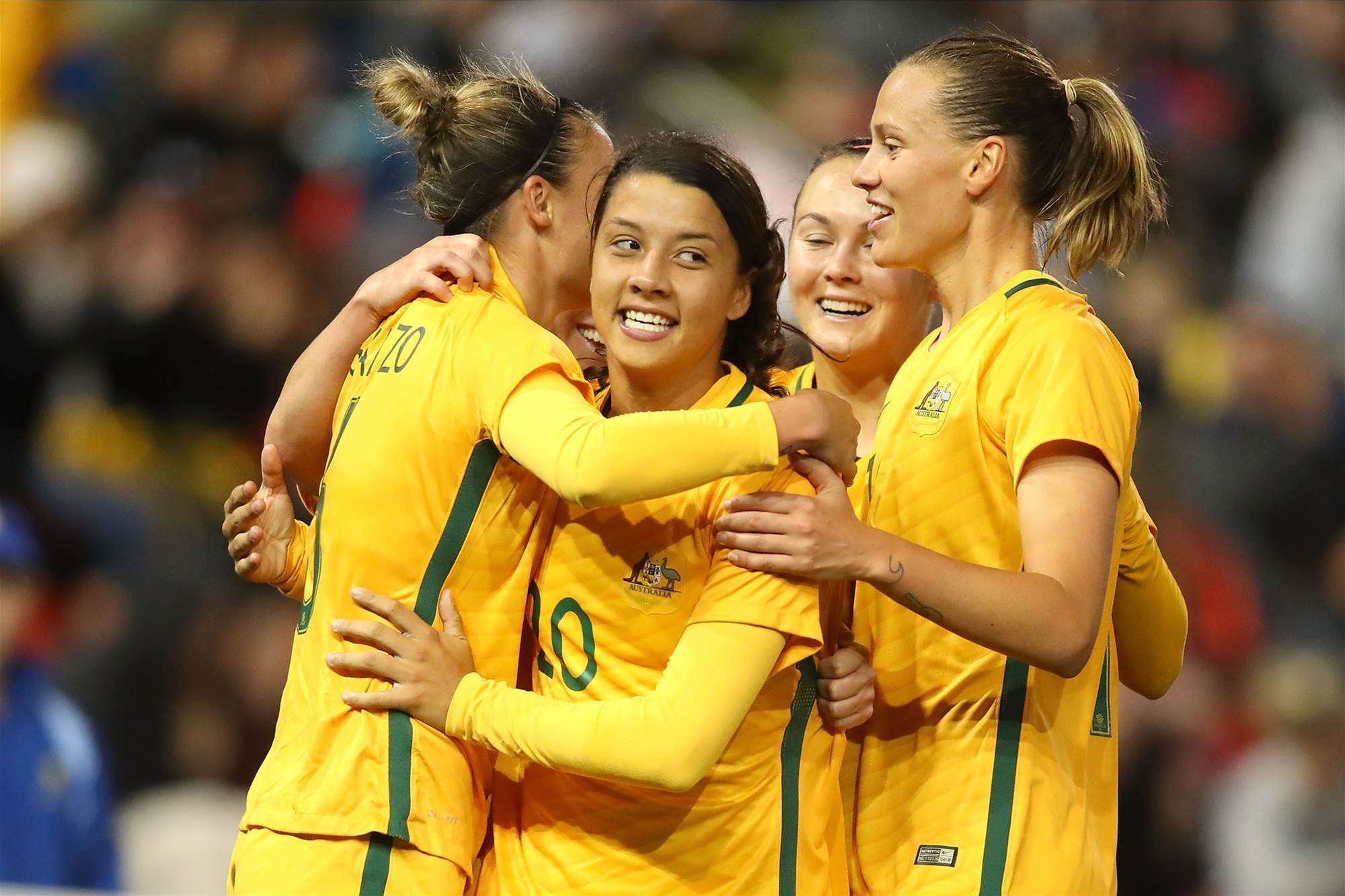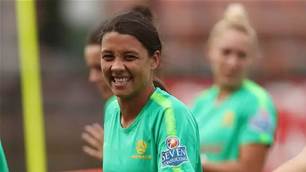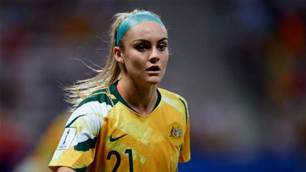Tempers flared overnight as Sam Kerr was overlooked for the three finalist spots for FIFA Women's Player of the Year. But how do her statistics compare with the finalists?
It's a decision that sent shockwaves around the football community, but there was little predicting the outrage that Sam Kerr's exclusion from the 2017 FIFA Women's Player of the Year finalists was going to produce.
After all, 2017 is arguably Kerr’s first year as an undoubted superstar.
The context
After years of fulfilling the immensely quick, agile winger role for the Matildas, over the last eighteen months Kerr had finally become the consistent goalscorer for country that she had been for club(s).
As Lisa De Vanna crept towards retirement age, it was the one thing this Matilda’s squad required, and for Alen Stajcic and co, the results soon followed.
When the Matilda’s beat the U.S for the first time in their history, before routing Japan and humiliating Brazil 6-1 to win the 2017 Tournament of Nations, hope gradually turned to acceptance. Perhaps everyone knew it apart from Kerr herself. The Matilda’s had one of the greatest female footballers in the world.

Sam Kerr had finished top scorer in the Tournament of Nations in the same year that she’d become the all time leading goalscorer in the U.S National Women’s Soccer League.
So when the time came for the announcement of the FIFA Player of the Year finalists – a ceremony that has never captured the imagination of this country before – Australians weren’t just hopeful, they were expectant.
Alas, as is becoming a drearily familiar tale for Australian football fans, hopes can be dashed in an instant. There was no Kerr in the final three, those spots were taken by American midfielder Carli Lloyd, the Netherlands' Leike Martens and Venezuela's 18 year-old striker Deyna Castellanos.
The global reaction was swift and merciless to the award's credibility. There was scant commendation for the three finalists – even U.S national team icons Abby Wambach and Julie Foudy took to twitter to express their shock at Kerr's snub.
The feeling around Aussie football had changed. Now, there was an air of injustice.
But should there have been? Kerr and the Matildas rise to prominence was exceptional, but was she really robbed, or just beaten fair and square?
The analysis
Now that the smoke’s clearing, the real work begins. There were ten female nominees to be whittled down to three finalists, featuring only two others – the Netherland’s Vivianne Miedema and Lieke Martens – who had won an international tournament in 2017.
Given the lack of non-invitational, international tournaments beside EURO 2017, judgements were always going to weigh heavily on club performance.
Kerr finished second in the W-League top scorers tally, two goals behind Canberra United’s Ashleigh Sykes. After finishing the regular season in second place, Kerr also failed to score in the final series, as Perth eventually lost the Grand Final 2-0 to Melbourne City.
This noted, any indignation at Kerr’s statistics should have been put to rest by her end of season award tally – the Julie Dolan, Penny Tanner Media MVP and Goal of the Season awards ensuring Kerr’s performance was rightfully acknowledged as no less than phenomenal.
For her NWSL side, Sky Blue, results were somewhat similar. Sky Blue are currently sixth in their league and didn’t qualify for finals, but Kerr scored nine goals in nine appearances, with a shot conversion rate of almost 50%. She also won two out of six Player of the Month awards.
Most impressively, as of August 2017, she led the WSNL all-time scoring charts with 41 goals, seven ahead of her nearest rival.
Finally, Kerr scored seven goals in nine appearances for the Matildas in 2017. While she dominated the inaugural Tournament of Nations, she failed to find the net in any of the Matildas’ more prestigious Algarve Cup matches, as they finished in fourth place.
It’s worth mentioning here that goals – Kerr’s undoubted strength this year – have seemingly been of little significance in this year’s decision. Danish striker Pernille Harder scored nine international goals this year, top scored in the Algarve Cup and took Denmark to the final of Euro 2017, but was similarly overlooked for the Player of the Year finalists.

Carli Lloyd
So what did the judging panels base their decision on?
American Carli Lloyd won the Player of the Year award in 2015 and 2016, and was named as one of the three finalists for this year’s decision, with her unique brand of powerhouse, box-to-box midfield play clearly a favourite among the judges.
She didn’t win an individual award this season at club or international level, nor did she score an international goal, but she led Manchester City to an F.A Cup triumph and a UEFA Champions League semi-final.
She did however, miss out on the Champions League Squad of the Season for 2016/17, with fellow Manchester City midfielder and English international Jill Scott garnering greater plaudits for the Citizen’s run in that competition.
While she missed most of Houston Dash’s 2017 season, upon rejoining the squad Lloyd has scored one goal and received one red card as her side slipped down to eighth in their league standings and failed to make the finals campaign.
The U.S Women’s National Team had a fairly poor year by their own lofty standards. They lost two out of three games to finish last at the SheBelieves Cup and finished runner up at the Tournament of Nations – both held on home soil – to Australia. They also briefly lost their World No.1 ranking, however reclaimed it towards the end of the year.
Leike Martens
Like Kerr, Martens is a pacey, dangerous winger whose versatility perhaps outmatches Kerr’s own. Leike scored eight international goals in 2017 as the Netherlands won the 2017 European Championships.
She was voted Player of the Tournament with three goals and two assists, and her dribbling provided much of the tournament’s highlight reel as Marten’s stamped her authority upon Europe’s best.
At club level, she led FC Rosengard to second place in the Swedish Damallsvenskan, finishing as equal fifth top scorer.
She led her club to the quarter final of the UEFA Champions League, where she also failed to make the Squad of the Season, but it was really her performance at international level that saw her nominated as one of the three finalists.
Deyna Castellanos
18-year-old Venezuelan Castellanos played in the second division of U.S women’s football in 2017, where she was named in the UWS All-League First Team and the League’s Player of the Year, scoring five goals in seven appearances.
Her side, Santa Clarita Blue Heat, finished in first place in the UWS’ western conference, and lost in the Championship Final.
She then returned to college side Florida State, where she’s scored 16 goals in 21 appearances. In 2016, her scoring form led Venezuela to fourth place at the 2016 FIFA Women’s U/17 World Cup, however the 2017 award should not take into account 2016 performances. Castellanos is yet to score for the Venezuela National Team.
The verdict
It’s extremely hard to see why Lloyd was chosen before Sam Kerr. Lloyd’s main saving grace appears to be her skill and influence within the world’s number one ranked nation, but that withstanding, there are few individual reasons why Lloyd deserves to be in the three finalists for World Player of the Year.
Marten’s choice is less controversial. Germany had dominated the Euros for 22 years, so the Netherland’s victory was both overdue and highly surprising.
The style with which Martens impressed was highly reminiscent of the skillful flair and speed that dominates the male Player of the Year awards, but has not featured heavily in the women’s version since Marta’s three titles.
Castellanos, despite being a sensation in women’s football, is another surprising inclusion on this list.
She’s been playing at a lower level then every other player in the ten original nominees, and her inclusion over Kerr suggests that the W-League may not attract the appropriate respect among foreign adjudicators.
It’s doubtful that FIFA will respond to the selection controversy, but there are significant questions hanging over their criteria and processes. To continue to grow the women’s side of the game, the importance of prestigious awards cannot be overstated.
The game revolves around it's stars and they need to be properly acknowledged. They're the greatest asset the sport has.
Which is why it's important that Kerr carries on letting her feet do the talking. At the moment, they're one of the powerful voices in the game.
Related Articles

Kerr, fellow Matildas to be consulted in coach search

'Timing not right': Montemurro's verdict on Matildas vacancy













